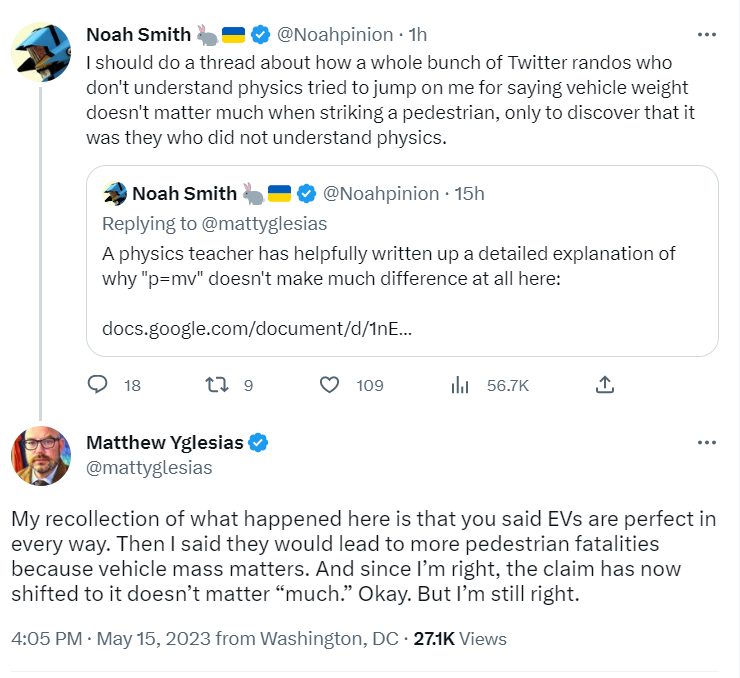Anyway, these are the main arguments I see against the EV transition, and as far as I can tell, they all clearly miss the mark. (There’s also the question of whether we can build enough transmission lines to charge our EVs, but in fact I’m not worried about this; if anything, widespread EV ownership will create more political will to build the transmission lines we need anyway.) The EV revolution is simply a clear-cut case where the human race invented a better technology than what we were using before, and now we’re going to switch to that better technology. Electric vehicles are going to win; just sit back and watch.
Now there are some secondary issues here, like does the heavier weight of an EV make it more dangerous. Which led to this exchange:
I am not going to overly weigh in here, except to note that assumptions like "brakes will be stronger" are not always as true as we'd like and that EVs typically accelerate faster, which can be a big deal in pedestrian dense areas.
Far more on point was Lyman Stone's report of renting a Tesla for a work trip. Practical experience backed up all of the limitations of the car for these operations. Charging (even supercharging) is vastly more time consuming than fueling. Range is lowest for highway driving. The need for a dense charging infrastructure becomes clear and while supercharging seems to have only a modest effect on battery life, it also doesn't seem to be zero. When battery replacement can be up to $20,000 (Tesla Model S) this is not a trivial consideration.
Lyman's key point (at least for EVs in general, he also has issues with Tesla controls) is:
It really does seem to be an hour:Superchargers can recharge a vehicle’s battery up to 80% in just about 40 minutes. After the battery reaches 80%, it will begin to charge slower to protect the battery’s health until it reaches a full charge.
That suggests full charge is likely to take an hour. You also have range degradation as the battery degrades. Without supercharging the same resource suggests a charging time between 9.9 hours and 3.4 days (yes, that is DAYS) for an empty battery. If the car is driven a short distance and then is recharged overnight then that is probably ok. But no long distance trip could put up with that level of time. This also presumes that your company doesn't throttle your range to sell upgrades, but who would do that?
I think this is a rare case of our blog lagging opinion, but it seems clear that the best use of the EV is for as a solution for short range trips with known equipment on both ends. I am even more bullish about e-bikes for a lot of the warmer parts of the United States, making it possible to combine light exercise with short distance transit. But you know what has none of these problems and dramatically reduces emissions compared to traditional internal combustion engines? A Prius.
________________________________________
[Ed Niedermeyer is probably the leading journalist on the Tesla/EV beat. He's been pushing a much more constraint-conscious approach than Smith does. For a sense of where he;s coming from, I'd recommend this guest op-ed from the NYT: "We Can’t Just Throw Bigger Batteries at Electric Vehicles" (and you know how it pains me to link to anything from that paper). -- MP]


No comments:
Post a Comment